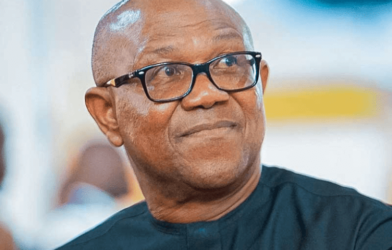187
Politics apart, the aggregate of opinion is that Nigeria is in a very bad shape; opinion is divided, though, on what needs to be done to return it to a better shape. Has this become a mission impossible? Can Nigeria be salvaged or is it beyond redemption? Is the task of our heroes, past and present, condemned to being like that of Sisyphus? Greek mythology records that Sisyphus, a king of Corinth, was punished in Hades (Hell) for his misdeeds by being condemned eternally to rolling a heavy stone up a hill: Each time he approached the top of the hill, the stone escaped his grasp, rolled to the bottom, ad nauseam, ad infinitum! Nigeria escaped what we thought was a gripping debt burden under President Olusegun Obasanjo only to run headlong into a more scandalously vicious debt trap nuder President Muhammadu Buhari!
The opinion you are about to read is that of Prof. Banji Akintoye, Yoruba Nation protagonist, who insists that this house has already fallen! How? Why? What can still be done? Titled “NIGERIA NEEDS NOW THE COURAGE TO DISSOLVE PEACEFULLY”, his views are articulate, profound and arresting, which was why I chose to share excerpts of them with my readers here today. Enjoy it! Reactions are welcome!
“At independence in 1960, Nigeria was truly the economic giant and hope of Africa. Nigeria was 25% of the population of Black Africa. One of the Regions of the Nigerian Federation, the Western Region, had the most intensely educated population in Africa, and Nigeria, therefore, had the largest and most solid class of educated professionals in Africa. By the time of independence, Nigeria ranked as one of the world’s largest exporters of cocoa (from the Western Region), palm products (from the Eastern Region) and groundnuts (from the Northern Region).
Of minerals, Nigeria was an exporter of tin (mined on the Jos Plateau) and coal (mined on Udi Hill near Enugu), and every region of Nigeria had rich deposits of minerals. The Western Region had the second largest deposit of bitumen in the world, and the Northern Region had deposits of uranium. Nigeria was known to have rich deposits of petroleum; by the 1970s, Nigeria became one of the leading producers and exporters of petroleum in the world, earning phenomenal revenues that made the country one of the world’s richest countries. Altogether, Nigeria seemed to be heading to success, wealth, prosperity and power. Unhappily, however, Nigeria lacked the inner unity and strength needed for such greatness.
The hundreds of peoples of Nigeria, pushed together in 1914 by the British, were radically different in culture, political traditions, religion, attitudes to religious diversity, and attitudes to modern change. Until after the Second World War, the British did nothing to give Nigeria a unified existence. When at last they granted a unifying constitution in 1949-51 and created under it a Federation of three Regions (Eastern, Northern and Western Regions), they boldly wrote conflict and instability into the life of the Federation –by disrespecting obvious ethnic boundaries in the delineation of the Regions’ boundaries, by making the Northern Region much larger than the Eastern and Western Regions put together, by giving the Northern Region a decisive majority in the Federal Parliament, and by generally creating the impression that the Northern Region was destined to lead the Federation.
The Regions did well for their peoples (with the Western Region as the development leader and pace setter), but rancor, hatred and unhealthy rivalry marked their relationships. Then, to ensure Britain’s continued control of the Nigerian economy after independence, the British maneuvered in great detail (falsified the national census, installed stumbling blocks in the constitution, rigged the pre-independence election, heavily influenced the post-election inter-party negotiations) to give dominance to the Fulani leadership of the Northern Region over Nigeria’s Federal Government at independence. By doing these things, the British essentially placed a death sentence on Nigeria.
The Fulani were one of Nigeria’s smallest peoples (only about six million in the Northern Region), were a non-indigenous people, had no homeland in Nigeria or anywhere, were part of a Fulani people scattered all over West Africa, consisted mostly of nomadic cattle herders, were the least educated people in Nigeria and the least desirous of modern education, and were the least capable of leading a modern country along modernity lines. Lacking an understanding of the nature of a modern country, the Fulani decided immediately at independence that they were meant to be the new colonial overlords of Nigeria.
Nigeria’s sad journey thus began – through endless falsifications and manipulations of political processes, falsifications of censuses, destruction of the federation through centralization of all power and resource control, destruction of Regional and local initiatives in the economy, rancor and acrimony, inter-people conflicts, pogroms, civil war, religious violence, Fulani use of military force for an attempt to conquer all of Nigeria’s indigenous peoples, economic decline, Fulani invitation to other West African Fulani to help conquer Nigeria’s indigenous peoples, Fulani attraction of international terrorist groups to help the Fulani conquest, a destructive push to turn Nigeria to a Muslim country by violence, vicious insecurity, rivers of blood, economic collapse, to the now inevitable break-up.
The early Fulani adventure to expand their control over all of Nigeria featured a major agenda, embarked upon in 1962 and covertly assisted by the British, to subdue the Western Region (Nigeria’s leader and pace-setter in development). The adventure destroyed the Western Region’s and Nigeria’s development progress, dragged down Nigeria’s security, and provoked the first military coup in 1966. From then on, there followed a long succession of military coups and military dictators until 1999 – with only a brief civilian interlude in 1979-83. The military dictators relentlessly destroyed the federal principle in favor of centralization. The military dictators from July 1966 on, being all Northerners, pushed for further and further centralization and Northern Fulani dominance. This provoked resistance and bloody conflicts, and an attempt by the Igbo-led Eastern Region to secede from Nigeria in 1967. The attempt started a 30-month civil war, 1967-70, which took about two million lives among the Igbo people.
As if to wipe off these self-imposed disasters, mineral oil began in the early 1970s to boost Nigeria’s economic strength, by making phenomenal amounts of money available to Nigeria’s development. Nigeria’s prospects were so rosy by the late 1970s that some patriotic Nigerians embarked on putting together a dazzling program of development for Nigeria. Some of the youthful intellectuals in this group even believed that they could make Nigeria the ‘Blackman’s World Power of Modern Times’. But Nigeria lacked the unity, the cohesiveness and the orderly political and economic life necessary for such great accomplishments.
A manipulated, blatantly rigged and violently protested election in 1979 shot down those who were proudly talking of building the ‘Blackman’s World Power’. From then on, rather than grow in prosperity and power, Nigeria entered into a process of truculent Fulani grabbing of control, of unrelenting centralization of political power, resource control and development management, and the most rabid culture of public corruption in the world. The Northern Fulani control became so total that one of the military dictators felt free in 1993 to annul a completed and peaceful presidential election without giving any reason for his action, and another felt free to arrest and imprison the winner of the election and then to institute a murderous reign of terror to stop popular reaction, and yet another unilaterally imposed a constitution on Nigeria by decree in 1999.
The Nigerian culture of impunity and public corruption has grown so mightily since then that it has earned Nigeria, year after year, the assessment as one of the most corrupt countries in the world. Since 2018, Nigeria has been classified as the Number One home of ‘extreme poverty’ in the world. The succession of the Northern military dictators from 1985 to 1999, serving the purposes of centralization and of Fulani control of power and resources, rammed down their system irremediably. In spite of Nigeria’s hundreds of nationalities, Nigeria lost federalist direction and became simply a country under complete control of a central government firmly controlled by mostly Fulani nationality. Nigeria’s central government became an instrument for managing, not Nigeria’s development, but for managing Nigeria’s titanic and complex culture of public corruption.
In the end, the Nigerian Fulani political elite, intoxicated by all this great success of theirs in the politics of Nigeria and by continued covert British support, embarked upon a pre-modern and primitive ambition to employ violence to conquer all the other nations of Nigeria and turn their homelands into a large Fulani homeland. The outside world, lacking an understanding of this bizarre political turn in Nigeria, wrongly saw it as a development arising simply from climate change – from the coming of prolonged droughts in the West African Sahel and Sudan from the 1990s, and the consequent veering of Fulani cattle herdsmen southwards into the forest territories in search of grass for their cattle and, therefore, intensified conflicts between farmers and cattle herders in Nigeria. But that is not the true explanation for what has been happening in Nigeria…
As soon as a Fulani leader, Muhammadu Buhari, was elected President of Nigeria in 2015, the Fulani seriously commenced their planned conquest of Nigeria. For the next eight years under Buhari, Fulani cattle herders and militias, indoctrinated with the message that Allah had given the whole of Nigeria to the Fulani for a Fulani homeland, and heavily armed with sophisticated modern weapons (mostly AK 47 rifles), spread out all over the South and Middle Belt of Nigeria, destroying or burning farms, farmsteads and villages, killing farmers and farmers’ wives and children, wiping out the inhabitants of whole villages, raping and killing women, killing children on the way to or from school, kidnapping countless people, extorting enormous amounts of money as ransom for the kidnapped…
As President Tinubu was being sworn in on May 29, 2023 to succeed Buhari, greatly confident armies of Fulani destroyers and killers were waiting for him. They were sitting on the enormous amounts of Nigeria’s money that had been stolen in recent years for the Fulani war of conquest, and they owned enormous arsenals of various weapons, and countless thousands of Fulani killers and international terrorists. They immediately heightened the tempo and viciousness of their killing and kidnapping. In January 2024, they publicly announced that they had declared war against Tinubu himself and threatened to invade the president’s offices and seize the seat of power!
In summary, Nigeria’s economy has collapsed, Nigeria’s security has collapsed, Nigerians are living a life of wrenching poverty and hunger, a life of frightful insecurity and chaos…Terrible hunger grips the life of most Nigerians… On the floor of the Nigerian National Assembly, legislators are breaking into tears as they recount the economic suffering and the drastic insecurity of the people of their constituencies, and many legislators are denouncing Nigeria’s presidential system and calling for its abolition. Many influential Nigerians are publicly advising ordinary Nigerians to buy guns for self-defence. In all regions of Nigeria, huge numbers of hungry people are protesting in the streets, crying of hunger. (TO BE CONTINUED).
turnpot@gmail.com 0705 263 1058
Former Editor of PUNCH newspapers, Chairman of its Editorial Board and Deputy Editor-in-chief, BOLAWOLE was also the Managing Director/ Editor-in-chief of THE WESTERNER newsmagazine. He writes the ON THE LORD’S DAY column in the Sunday Tribune and TREASURES column in New Telegraph newspaper on Wednesdays. He is also a public affairs analyst on radio and television.












Comments are closed